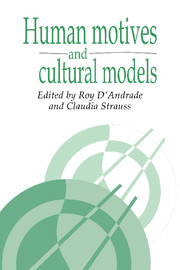Book contents
- Frontmatter
- Contents
- List of illustrations
- Preface
- List of contributors
- 1 Models and motives
- Part I Cultural models as motives
- Part II How do cultural models become motives?
- Part III Cultural models as motives reconsidered
- 8 Motivated models
- 9 What makes Tony run? Schemas as motives reconsidered
- 10 Afterword
- Index
8 - Motivated models
Published online by Cambridge University Press: 05 June 2012
- Frontmatter
- Contents
- List of illustrations
- Preface
- List of contributors
- 1 Models and motives
- Part I Cultural models as motives
- Part II How do cultural models become motives?
- Part III Cultural models as motives reconsidered
- 8 Motivated models
- 9 What makes Tony run? Schemas as motives reconsidered
- 10 Afterword
- Index
Summary
Talk of the motives, needs, or goals of individuals has been common in psychological anthropology, but it is only recently that cognitive anthropologists have become interested in the problem of how the cultural knowledge systems they describe are related to such things. Traditionally, there has been little attention paid to the question of how thoughts or cultural knowledge are related to desire, interest, affect, or motive. The problem has recently been raised and phrased in several different ways. D'Andrade (1984) has called attention to the “directive force of cultural models”; Quinn (1982) and Nardi (1983) have discussed goal-generated and goal-generating thinking; and Hutchins (1987) has explored the connections between repression and the shape of mythic schemas. These “cognitively” oriented anthropologists raise issues concerning what might also be termed the wanting in thinking (in psychological terms) or the group interests implicated in the forms of social knowledge (in more social terms) or the habitus (in Bourdieu's psychohistorical term).
The question of the relationship between goals and cultural models or knowledge has been discussed in broadly similar terms in many corners of the discipline of anthropology. One of the sources of this wide concern can be sought in the western cultural foundations of social science and particularly in the dichotomous terms our tradition provides or perhaps forces upon us. The dualisms of desire and rationality, of feeling and thinking, and of pleasure and reality provide much of the impetus for academic discussions in which these culturally provided tensions are worked with and against. Goals need to be connected with knowledge because they have first been culturally sundered.
- Type
- Chapter
- Information
- Human Motives and Cultural Models , pp. 181 - 196Publisher: Cambridge University PressPrint publication year: 1992
- 8
- Cited by



